Behavioural and cognitive-behavioural interventions for outwardly directed aggressive behaviour in people with intellectual disabilities
- PMID: 36745863
- PMCID: PMC9901280
- DOI: 10.1002/14651858.CD003406.pub5
Behavioural and cognitive-behavioural interventions for outwardly directed aggressive behaviour in people with intellectual disabilities
Abstract
Background: Outwardly directed aggressive behaviour in people with intellectual disabilities is a significant issue that may lead to poor quality of life, social exclusion and inpatient psychiatric admissions. Cognitive and behavioural approaches have been developed to manage aggressive behaviour but the effectiveness of these interventions on reducing aggressive behaviour and other outcomes are unclear. This is the third update of this review and adds nine new studies, resulting in a total of 15 studies in this review.
Objectives: To evaluate the efficacy of behavioural and cognitive-behavioural interventions on outwardly directed aggressive behaviour compared to usual care, wait-list controls or no treatment in people with intellectual disability. We also evaluated enhanced interventions compared to non-enhanced interventions.
Search methods: We used standard, extensive Cochrane search methods. The latest search date was March 2022. We revised the search terms to include positive behaviour support (PBS).
Selection criteria: We included randomised and quasi-randomised trials of children and adults with intellectual disability of any duration, setting and any eligible comparator.
Data collection and analysis: We used standard Cochrane methods. Our primary outcomes were change in 1. aggressive behaviour, 2. ability to control anger, and 3. adaptive functioning, and 4.
Adverse effects: Our secondary outcomes were change in 5. mental state, 6. medication, 7. care needs and 8. quality of life, and 9. frequency of service utilisation and 10. user satisfaction data. We used GRADE to assess certainty of evidence for each outcome. We expressed treatment effects as mean differences (MD) or odds ratios (OR), with 95% confidence intervals (CI). Where possible, we pooled data using a fixed-effect model.
Main results: This updated version comprises nine new studies giving 15 included studies and 921 participants. The update also adds new interventions including parent training (two studies), mindfulness-based positive behaviour support (MBPBS) (two studies), reciprocal imitation training (RIT; one study) and dialectical behavioural therapy (DBT; one study). It also adds two new studies on PBS. Most studies were based in the community (14 studies), and one was in an inpatient forensic service. Eleven studies involved adults only. The remaining studies involved children (one study), children and adolescents (one study), adolescents (one study), and adolescents and adults (one study). One study included boys with fragile X syndrome. Six studies were conducted in the UK, seven in the USA, one in Canada and one in Germany. Only five studies described sources of funding. Four studies compared anger management based on cognitive behaviour therapy to a wait-list or no treatment control group (n = 263); two studies compared PBS with treatment as usual (TAU) (n = 308); two studies compared carer training on mindfulness and PBS with PBS only (n = 128); two studies involving parent training on behavioural approaches compared to wait-list control or TAU (n = 99); one study of mindfulness to a wait-list control (n = 34); one study of adapted dialectal behavioural therapy compared to wait-list control (n = 21); one study of RIT compared to an active control (n = 20) and one study of modified relaxation compared to an active control group (n = 12). There was moderate-certainty evidence that anger management may improve severity of aggressive behaviour post-treatment (MD -3.50, 95% CI -6.21 to -0.79; P = 0.01; 1 study, 158 participants); very low-certainty evidence that it might improve self-reported ability to control anger (MD -8.38, 95% CI -14.05 to -2.71; P = 0.004, I2 = 2%; 3 studies, 212 participants), adaptive functioning (MD -21.73, 95% CI -36.44 to -7.02; P = 0.004; 1 study, 28 participants) and psychiatric symptoms (MD -0.48, 95% CI -0.79 to -0.17; P = 0.002; 1 study, 28 participants) post-treatment; and very low-certainty evidence that it does not improve quality of life post-treatment (MD -5.60, 95% CI -18.11 to 6.91; P = 0.38; 1 study, 129 participants) or reduce service utilisation and costs at 10 months (MD 102.99 British pounds, 95% CI -117.16 to 323.14; P = 0.36; 1 study, 133 participants). There was moderate-certainty evidence that PBS may reduce aggressive behaviour post-treatment (MD -7.78, 95% CI -15.23 to -0.32; P = 0.04, I2 = 0%; 2 studies, 275 participants) and low-certainty evidence that it probably does not reduce aggressive behaviour at 12 months (MD -5.20, 95% CI -13.27 to 2.87; P = 0.21; 1 study, 225 participants). There was low-certainty evidence that PBS does not improve mental state post-treatment (OR 1.44, 95% CI 0.83 to 2.49; P = 1.21; 1 study, 214 participants) and very low-certainty evidence that it might not reduce service utilisation at 12 months (MD -448.00 British pounds, 95% CI -1660.83 to 764.83; P = 0.47; 1 study, 225 participants). There was very low-certainty evidence that mindfulness may reduce incidents of physical aggression (MD -2.80, 95% CI -4.37 to -1.23; P < 0.001; 1 study; 34 participants) and low-certainty evidence that MBPBS may reduce incidents of aggression post-treatment (MD -10.27, 95% CI -14.86 to -5.67; P < 0.001, I2 = 87%; 2 studies, 128 participants). Reasons for downgrading the certainty of evidence were risk of bias (particularly selection and performance bias); imprecision (results from single, often small studies, wide CIs, and CIs crossing the null effect); and inconsistency (statistical heterogeneity).
Authors' conclusions: There is moderate-certainty evidence that cognitive-behavioural approaches such as anger management and PBS may reduce outwardly directed aggressive behaviour in the short term but there is less certainty about the evidence in the medium and long term, particularly in relation to other outcomes such as quality of life. There is some evidence to suggest that combining more than one intervention may have cumulative benefits. Most studies were small and there is a need for larger, robust randomised controlled trials, particularly for interventions where the certainty of evidence is very low. More trials are needed that focus on children and whether psychological interventions lead to reductions in the use of psychotropic medications.
Copyright © 2023 The Cochrane Collaboration. Published by John Wiley & Sons, Ltd.
Conflict of interest statement
DP is a 'Psychiatry of Intellectual Disabilities' Higher Trainee with the North London Higher Training Scheme, National Health Service (NHS). He has declared that he has no conflicts of interests.
SW is a Consultant Psychiatrist in Intellectual Disability Psychiatry. He has declared that he has no conflicts of interest.
AH is a Consultant Psychiatrist with the Camden Learning Disability Service and Professor of Psychiatry of Intellectual Disabilities at University College London (UCL), Division of Psychiatry. She reports receiving grants from the National Institute for Health Research (NIHR), Health Technology Assessment (HTA; funders of the Hassiotis 2018 study). AH occasionally receives honoraria and personal payments from academic institutions as an invited speaker/workshop leader and author of commissioned articles. AH is the author of two studies included in this review: Hassiotis 2009, funded by the South Essex Partnership University Foundation NHS Trust, and Hassiotis 2018, funded by NIHR HTA; payments were made to UCL (AH has not received any direct funds for her research). The funder of these studies had no role in the design, data collection, data analysis, data interpretation and reporting. Additionally, AH was not directly involved in assessing the eligibility of these studies, extracting data, assessing the risk of bias or grading the certainty of the evidence. However, she had an overview of the work completed for this document. She declares that at no point has she attempted to influence her co‐authors' decisions about these papers.
IH is a Consultant Psychiatrist for people with intellectual disability with the East London NHS Foundation Trust. He reports occasional payments for lectures on services for people with intellectual disability, and travel expenses to attend a conference to disseminate findings of a study, both from University College London (UCL); both personal payments. IH has peer reviewed research papers in academic journals relating to studies at UCL. IH reports that he is an investigator on the Hassiotis 2018 study, which is included in this review; the study was funded by NIHR, with payments for IH's involvement made to the East London NHS foundation Trust; however, the funder had no role in the study design, data collection, data analysis, data interpretation and reporting. Additionally, IH was not involved in making decisions about the inclusion of the paper in the review (i.e. he was not involved in assessing the eligibility of study, extracting data, assessing the risk of bias or grading the certainty of the evidence).
MM is a 'Psychiatry of Intellectual Disabilities' Higher Trainee with the North London Higher Training Scheme, National Health Service (NHS). He has declared that he has no conflicts of interests.
AA is a Consultant Psychiatrist for people with intellectual disability working at the East London NHS Foundation Trust and honorary Senior Clinical Lecturer at Queen Mary's University of London.
Figures










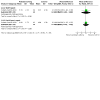
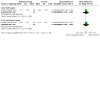




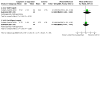
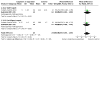
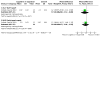
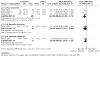
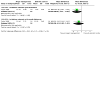

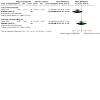
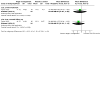
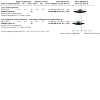


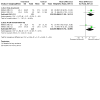





















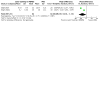










Update of
-
Behavioural and cognitive-behavioural interventions for outwardly-directed aggressive behaviour in people with intellectual disabilities.Cochrane Database Syst Rev. 2015 Apr 7;2015(4):CD003406. doi: 10.1002/14651858.CD003406.pub4. Cochrane Database Syst Rev. 2015. Update in: Cochrane Database Syst Rev. 2023 Feb 6;2:CD003406. doi: 10.1002/14651858.CD003406.pub5. PMID: 25847633 Free PMC article. Updated.
Comment in
-
Behavioural and cognitive-behavioural interventions: can they reduce aggressive behaviour in people with intellectual disabilities?J Prim Health Care. 2023 Mar;15(1):96-97. doi: 10.1071/HC23028. J Prim Health Care. 2023. PMID: 37000546 No abstract available.
References
References to studies included in this review
Collado‐Castillo 2010 {published data only}
-
- Collado-Castillo CJ. Comparison of a Cognitive Re-appraisal Approach and a Problem-Solving Approach to Improve Social Cognition in Adults with Intellectual Disabilities Who Exhibit Aggressive Behavior [PhD thesis]. New York (NY): Columbia University, 2010. [ERIC: eric.ed.gov/?id=ED518401]
Hall 2020 {published data only}
Hassiotis 2009 {published data only}
-
- Hassiotis A, Robotham D, Canagasebey A, Romeo R, Langridge D, Blizard R, et al. Randomized, single-blind, controlled trial of a specialist behaviour therapy team for challenging behaviour in adults with intellectual disabilities. American Journal of Psychiatry 2009;166(11):1278-85. [DOI: 10.1176/appi.ajp.2009.08111747] [PMID: ] - DOI - PubMed
Hassiotis 2018 {published data only}
-
- Hassiotis A, Poppe M, Strydom A, Vickerstaff V, Hall I, Crabtree J, et al. Positive behaviour support training for staff for treating challenging behaviour in people with intellectual disabilities: a cluster RCT. Health Technology Assessment 2018;22(15):1-110. [DOI: 10.3310/hta22150] [PMCID: PMC5900418] [PMID: ] - DOI - PMC - PubMed
-
- Hassiotis A, Poppe M, Strydom A, Vickerstaff V, Hall IS, Crabtree J. Clinical outcomes of staff training in positive behaviour support to reduce challenging behaviour in adults with intellectual disability: a cluster randomised controlled trial. British Journal of Psychiatry 2018;212(3):161-8. [DOI: 10.1192/bjp.2017.34] [PMID: ] - DOI - PubMed
-
- Strydom A, Bosco A, Vickerstaff V, Hunter R, Hassiotis A, PBS Study Group. Clinical and cost effectiveness of staff training in the delivery of Positive Behaviour Support (PBS) for adults with intellectual disabilities, autism spectrum disorder and challenging behaviour – randomised trial. BMC Psychiatry 2020;20(1):161-74. [DOI: 10.1186/s12888-020-02577-1] [PMCID: PMC7158144] [PMID: ] - DOI - PMC - PubMed
Ingersoll 2017 {published data only}
-
- Ingersoll B, Berger N, Carslen D, Hamlin T. Improving social functioning and challenging behaviours in adolescents with ASD and significant ID: a randomized pilot feasibility trial of reciprocal imitation training in a residential setting. Developmental Neurorehabilitation 2017;20(4):236-46. [DOI: 10.1080/17518423.2016.121187] [PMID: ] - DOI - PubMed
Jones 2021 {published and unpublished data}
-
- Jones J, Blinkhorn A, McQueen M, Hewett L, Mills-Rogers M-J, Hall L, et al. The adaptation and feasibility of dialectical behaviour therapy for adults with intellectual developmental disabilities and transdiagnoses: a pilot community-based randomized controlled trial. Journal of Applied Research in Intellectual Disabilities 2021;34(3):805-17. [DOI: 10.1111/jar.12860] [PMID: ] - DOI - PubMed
-
- Prior D [pers comm]. Information on your paper. Email to: J Jones 19 August 2021.
Kostulski 2021 {published data only}
McPhail 1989 {published data only}
Nezu 1991 {published data only}
Singh 2013 {published and unpublished data}
-
- Singh NN, Lancioni GE, Karazsia BT, Winton AS, Myers RE, Singh AN, et al. Mindfulness-based treatment of aggression in individuals with mild intellectual disabilities: a waiting list control study. Mindfulness 2013;4(2):158-67. [DOI: 10.1007/s12671-012-0180-8] - DOI
Singh 2016 {published data only}
-
- Singh NN, Lancioni GE, Karazsia BT, Chan J, Winton AS. Effectiveness of caregiver training in mindfulness-based positive behaviour support (MBPBS) vs training-as-usual (TAU): a randomized controlled trial. Frontiers in Psychology 2016;7:1549. [DOI: 10.3389/fpsyg.2016.01549] [PMCID: PMC5053082] [PMID: ] - DOI - PMC - PubMed
Singh 2020a {published and unpublished data}
-
- Singh NN, Lancioni GE, Medvedev ON, Myers RE, Chan J, McPherson CL, et al. Comparative effectiveness of caregiver training in mindfulness-based positive behaviour support (MBPBS) and positive behaviour support (PBS) in a randomized controlled trial. Mindfulness 2020;11(1):99-111. [DOI: 10.1007/s12671-018-0895-2] [PMCID: PMC7223775] [PMID: ] - DOI - PMC - PubMed
Taylor 2005 {published data only}
-
- Taylor JL, Novaco RW, Gillmer BT, Robertson A, Thorne I. Individual cognitive-behavioural anger treatment for people with mild-borderline intellectual disabilities and histories of aggression: a controlled trial. British Journal of Clinical Psychology 2005;44(3):367-82. [DOI: 10.1348/014466505X29990] [PMID: ] - DOI - PubMed
Willner 2002 {published data only}
-
- Willner P, Jones J, Tams R, Green G. A randomised controlled trial of the efficacy of a cognitive-behavioural anger management group for clients with learning disabilities. Journal of Applied Research in Intellectual Disabilities 2002;15(3):224-35. [DOI: 10.1046/j.1468-3148.2002.00121.x] - DOI
Willner 2013 {published and unpublished data}
-
- Felce D, Cohen D, Willner P, Rose J, Kroese B, Rose N, et al. Cognitive behavioural anger management intervention for people with intellectual disabilities: costs of intervention and impact on health and social care resource use. Journal of Intellectual Disability Research 2015;59(1):68-81. [DOI: 10.1111/jir.12112] [PMID: ] - DOI - PubMed
-
- Willner P, Rose J, Jahoda A, Kroese BS, Felce D, Cohen D, et al. Group-based cognitive-behavioural anger management for people with mild to moderate intellectual disabilities: cluster randomised controlled trial. British Journal of Psychiatry 2013;203(4):288-96. [DOI: 10.1192/bjp.bp.112.124529] [PMID: ] - DOI - PubMed
-
- Wilner P, Rose J, Jahoda A, Stenfert Kroese B, Felce D, MacMahon P, et al. A cluster randomised controlled trial of a manualised cognitive-behavioural anger management intervention delivered by supervised lay therapists to people with intellectual disabilities. Health Technology Assessment 2013;17(21):1-173. [DOI: 10.3310/hta17210] [PMCID: PMC4781451] [PMID: ] - DOI - PMC - PubMed
References to studies excluded from this review
Bagaiolo 2017 {published data only}
Bradshaw 2018 {published data only}
-
- Bradshaw J, Bearss K, McCracken C, Smith T, Johnson C, Lecavalier L, et al. Parent education for young children with autism and disruptive behavior: response to active control treatment. Journal of Clinical Child & Adolescent Psychology 2018;47(Suppl 1):S445-55. [DOI: 10.1080/15374416.2017.1381913] [PMCID: PMC6242765] [PMID: ] - DOI - PMC - PubMed
Coles 2018 {published data only}
-
- Coles CD, Kable JA, Taddeo E, Strickland D. GoFAR: improving attention, behavior and adaptive functioning in children with fetal alcohol spectrum disorders (FASD): brief report. Developmental Neurorehabilitation 2018;21(5):345-9. [DOI: 10.1080/17518423.2018.1424263] [PMCID: PMC6314185] [PMID: ] - DOI - PMC - PubMed
Durand 2013 {published data only}
-
- Durand VM, Heinemen M, Clarke S, Wang M, Rinaldi ML. Positive family intervention for severe challenging behavior I: a multisite randomized clinical trial. Journal of Positive Behavior Interventions 2013;15(3):133-43. [DOI: 10.1177/1098300712458324] - DOI
Favre 2018 {published data only}
-
- Favre E, Peyroux E, Babinet M-N, Poisson A, Demily C. Computer-based cognitive remediation program for the treatment of behavioral problems in children with intellectual disability: the «COGNITUS & MOI» study protocol for a randomized controlled trial. BMC Psychiatry 2018;18(1):235. [DOI: 10.1186/s12888-018-1810-z] [PMCID: PMC6053752] [PMID: ] - DOI - PMC - PubMed
Hampel 2015 {published data only}
-
- Hampel OA, Hasmann R, Hasmann SE, Holl RW, Karpinski N, Böhm R, et al. Psychological care of families with developmentally retarded or disabled children. Comparison between routine treatment with or without Stepping Stones Triple P parenting group training [Versorgung von Familien mit einem entwicklungsauffälligen oder behinderten Kind. Vergleich zwischen Routinebehandlungen mit und ohne Stepping-StonesTriple-P-Elterngruppentrainin]. Monatsschrift Kinderheilkunde 2015;163:1160-6. [DOI: 10.1007/s00112-015-3470-0] - DOI
Hinton 2017 {published data only}
Kong 2018 {published data only}
-
- Kong MM, Au TK. The Incredible Years parent program for Chinese preschoolers with developmental disabilities. Early Education and Development 2018;29(4):494-514. [DOI: 10.1080/10409289.2018.1461987] - DOI
Leung 2016 {published data only}
Leung 2020 {published data only}
-
- Leung C, Lai C, Lau D, Leung S, Pin TW. Effectiveness of a multidisciplinary parent training program for children with developmental disabilities: a single-blind randomized waitlist controlled trial. Journal of Child Health Care 2020;24(4):560-76. [DOI: 10.1177/1367493519880447] [PMID: ] - DOI - PubMed
McGill 2018 {published data only}
-
- McGill P, Vanono L, Clover W, Smyth E, Cooper V, Hopkins L, et al. Reducing challenging behaviour of adults with intellectual disabilities in supported accommodation: a cluster randomized controlled trial of setting-wide positive behaviour support. Research in Developmental Disabilities 2018;81:143-54. [DOI: 10.1016/j.ridd.2018.04.020] [PMID: ] - DOI - PubMed
McIntyre 2008 {published data only}
Palmer 2019 {published data only}
-
- Palmer M, Tarver J, Perez JP, Cawthorne T, Romeo R, Stringer D, et al. A novel group parenting intervention to reduce emotional and behavioural difficulties in young autistic children: protocol for the Autism Spectrum Treatment and Resilience pilot randomised controlled trial. BMJ Open 2019;9(6):e029959. [DOI: 10.1136/bmjopen-2019-029959] [PMCID: PMC6597639] [PMID: ] - DOI - PMC - PubMed
Ruane 2019 {published data only}
-
- Ruane A, Carr A, Moffat V, Finn T, Murphy A, O’Brien O, et al. A randomised controlled trial of the Group Stepping Stones Triple P training programme for parents of children with developmental disabilities. Clinical Child Psychology and Psychiatry 2019;24(4):728-53. [DOI: 10.1177/1359104519827622] [PMID: ] - DOI - PubMed
Schuiringa 2017 {published data only}
-
- Schuiringa H, Nieuwenhuijzen M, Orobio de Castro B, Lochman JE, Matthys W. Effectiveness of an intervention for children with externalizing behavior and mild to borderline intellectual disabilities: a randomized trial. Cognitive Therapy and Research 2017;41(2):237-51. [DOI: 10.1007/s10608-016-9815-8] [PMCID: PMC5346153] [PMID: ] - DOI - PMC - PubMed
Scudder 2019 {published data only}
-
- Scudder A, Wong C, Ober N, Hoffman M, Toscolani J, Handen BL. Parent–child interaction therapy (PCIT) in young children with autism spectrum disorder. Child & Family Behavior Therapy 2019;41(4):201-20. [DOI: 10.1080/07317107.2019.1659542] - DOI
Singh 2020b {published data only}
-
- Singh NN, Lancioni GE, Medvedev ON, Hwang Y-S, Myers RE. A component analysis of the mindfulness-based positive behavior support (MBPBS) program for mindful parenting by mothers of children with autism spectrum disorder. Mindfulness 2021;12(2):463-75. [DOI: 10.1007/s12671-020-01376-9] [PMCID: PMC7223597] [PMID: ] - DOI - PMC - PubMed
Tryer 2017 {published data only}
-
- Tryer P, Tarabi SA, Bassett P, Liedtka N, Hall R, Nagar J, et al. Nidotherapy compared with enhanced care programme approach training for adults with aggressive challenging behaviour and intellectual disability (NIDABID): cluster-randomised controlled trial. Journal of Intellectual Disability Research 2017;61(6):521-31. [DOI: 10.11/jir.12360] - DOI - PubMed
References to ongoing studies
Farris 2020 {published data only}
-
- Farris O, Royston R, Absoud M, Ambler G, Barnes J, Hunter R, et al. Clinical and cost effectiveness of a parent mediated intervention to reduce challenging behaviour in pre-schoolers with moderate to severe intellectual disability (EPICC-ID) study protocol: a multi-centre, parallel-group randomised controlled trial. BMC Psychiatry 2020;20(1):35. [DOI: 10.1186/s12888-020-2451-6] [PMCID: PMC6993328] [PMID: ] - DOI - PMC - PubMed
Additional references
Ali 2014
-
- Ali A, Blickwedel J, Hassiotis A. Interventions for challenging behaviour in intellectual disability. Advances in Psychiatric Treatment 2014;20(3):184-92. [DOI: 10.1192/apt.bp.113.011577] - DOI
Allen 2005
-
- Allen D, James W, Evans J, Hawkins S, Jenkins R. Positive behavioural support: definition, current status and future directions. Tizard Learning Disability Review 2005;10(2):4-11. [DOI: 10.1108/13595474200500014] - DOI
Aman 1985
-
- Aman MG, Singh NN, Stewart AW, Field CJ. The Aberrant Behavior Checklist: a behavior rating scale for the assessment of treatment effects. American Journal of Mental Deficiency 1985;89:485-91. - PubMed
Aman 1991
-
- Aman MG. Review and evaluation of instruments for assessing emotional and behavioural disorders. Australian and New Zealand Journal of Developmental Disabilities 1991;17(2):127-45. [DOI: 10.1080/07263869100034351] - DOI
APA 2000
-
- American Psychiatric Association. Diagnostic and Statistical Manual of Mental Disorders, Text Revision (DSM-IV-TR). 4th edition. Washington (DC): American Psychiatric Association, 2000.
APA 2013
-
- American Psychiatric Association. Diagnostic and Statistical Manual of Mental Disorders (DSM-5). 5th edition. Washington (DC): American Psychiatric Association, 2013.
Beecham 1992
-
- Beecham J, Knapp MR. Costing psychiatric interventions. In: Thornicroft GJ, Brewin CR, Wing JK, editors(s). Measuring Mental Health Needs. London (UK): Gaskell/Royal College of Psychiatrists, 1992.
Begg 1994
-
- Begg CB, Mazumdar M. Operating characteristics of a rank correlation test for publication bias. Biometrics 1994;50(4):1088-101. [PMID: ] - PubMed
Benson 1992
Bishop 2004
-
- Bishop SR, Lau M, Shapiro S, Carlson L, Anderson ND, Carmody J, et al. Mindfulness: a proposed operational definition. Clinical Psychology: Science and Practice 2004;11(3):230-41. [DOI: 10.1093/clipsy.bph077] - DOI
Borthwick‐Duffy 1994
-
- Borthwick-Duffy SA. Prevalence of destructive behaviors. A study of aggression, self-injury, and property destruction. In: Thompson T, Gray DB, editors(s). Destructive Behavior in Developmental Disabilities. Thousand Oaks (CA): Sage Publications, 1994:3-23. [ISBN: 0803955820]
Bowring 2017
Carr 1999
-
- Carr EG, Horner RH, Turnbull AP, Marquis JG, McLaughlin DM, McAtee ML, et al. Positive Behavior Support for People with Developmental Disabilities: a Research Synthesis. Washington (DC): American Association on Mental Retardation, 1999.
Carr 2009
Chapman 2013
-
- Chapman MJ, Hare DJ, Caton S, Donalds D, McInnis E, Mitchell D. The use of mindfulness with people with intellectual disabilities: a systematic review and narrative analysis. Mindfulness 2013;4:179-89. [DOI: 10.1007/s12671-013-0197-7] - DOI
Ciesinski 2022
Cooper 2009
-
- Cooper S-A, Smiley E, Jackson A, Finlayson J, Allan L, Mantry D, et al. Adults with intellectual disabilities: prevalence, incidence and remission of aggressive behaviour and related factors. Journal of Intellectual Disability Research 2009;53(3):217-32. [DOI: 10.1111/j.1365-2788.2008.01127.x] [PMID: ] - DOI - PubMed
Crocker 2006
Cummins 1997
-
- Cummins RA, McCabe MP, Romeo Y, Reid S, Waters L. An initial evaluation of the Comprehensive Quality of Life Scale – Intellectual Disability. International Journal of Disability, Development and Education 1997;44:7-19. [DOI: 10.1080/0156655970440102] - DOI
Deeks 2022
-
- Deeks JJ, Higgins JP, Altman DG, editor(s). Chapter 10: Analysing data and undertaking meta-analyses. In: Higgins JP, Thomas J, Chandler J, Cumpston M, Li T, Page MJ, Welch VA, editor(s). Cochrane Handbook for Systematic Reviews of Interventions Version 6.3 (updated February 2022). Cochrane, 2022. Available from www.training.cochrane.org/handbook.
Department of Health 2012
-
- Department of Health. Transforming care: a national response to Winterbourne View Hospital. Department of Health review: final report; December 2012. assets.publishing.service.gov.uk/government/uploads/system/uploads/attac... (accessed prior to 12 January 2023).
Didden 1997
-
- Didden R, Duker PC, Korzilius H. Meta-analytic study on treatment effectiveness for problem behaviours with individuals who have mental retardation. American Journal of Mental Retardation 1997;101(4):387-99. [PMID: ] - PubMed
Didden 2006
-
- Didden R, Korzilius H, Oorsouw W, Sturmey P. Behavioral treatment of challenging behaviors in individuals with mild mental retardation: meta-analysis of single-subject research. American Journal of Mental Retardation 2006;111(4):290-8. [DOI: 10.1352/0895-8017(2006)111[290:BTOCBI]2.0.CO;2] [PMID: ] - PubMed
Egger 1997
Einfeld 2007
-
- Einfeld SL, Tonge BJ, Steinhausen HC. Verhaltensfragebogen für Entwicklungsstörungen. Göttingen (Germany): Hogrefe, 2007.
Emerson 1995
-
- Emerson C. Challenging Behaviour: Analysis and Intervention in People with Learning Difficulties. Cambridge (UK): Cambridge University Press, 1995.
Fisher 1993
Gamble 2005
Gerow 2018
-
- Gerow S, Davis T, Radhakrishnan S, Gregori E, Rivera G. Functional communication training: the strength of evidence across disabilities. Exceptional Children 2018;85(1):86-103. [DOI: 10.1177/0014402918793399] - DOI
Gore 2013
-
- Gore NJ, McGill P, Toogood S, Allen D, Hughes JC, Baker P, et al. Definition and scope for positive behavioural support. BILD International Journal of Positive Behavioural Support 2013;3(2):14-23. [URL: tinyurl.com/y3uthv46]
Gore 2022
-
- Gore NJ, Sapiets SJ, Denne LD, Hastings RP, Toogood S, MacDonald A, et al. Positive behavioural support in the UK: a state of the nation report. International Journal of Positive Behavioural Support 2022;12(Suppl 1):1-46. [ISSN: ISSN 2047-0924 (Print)]
GRADEpro GDT [Computer program]
-
- GRADEpro GDT. Version accessed 15 January 2023. Hamilton (ON): McMaster University (developed by Evidence Prime), 2021. Available at gradepro.org.
Hassiotis 2022
-
- Hassiotis A, Rudra S. Behaviours that challenge in adults with intellectual disability: overview of assessment and management. BJPsych Advances 2022;28(6):393-400. [DOI: 10.1192/bja.2022.28] - DOI
Heyvaert 2010
Heyvaert 2012
-
- Heyvaert M, Maes B, den Noortgate W, Kuppens S, Onghena P. A multilevel meta-analysis of single-case and small-n research on interventions for reducing challenging behavior in persons with intellectual disabilities. Research in Developmental Disabilities 2012;33(2):766-80. [DOI: 10.1016/j.ridd.2011.10.010] [PMID: ] - DOI - PubMed
Higgins 2011
-
- Higgins JP, Altman DG, Sterne JA, editor(s). Chapter 8: Assessing risk of bias in included studies. In: Higgins JP, Green S, editor(s). Cochrane Handbook for Systematic Reviews of Interventions Version 5.1.0 (updated March 2011). The Cochrane Collaboration, 2011. Available from training.cochrane.org/handbook/archive/v5.1/.
Higgins 2022
-
- Higgins JP, Eldridge S, Li T, editor(s). Chapter 23: Including variants on randomized trials. In: Higgins JP, Thomas J, Chandler J, Cumpston M, Li T, Page MJ, Welch VA, editor(s). Cochrane Handbook for Systematic Reviews of Interventions Version 6.3 (updated February 2022). Cochrane, 2022. Available from www.training.cochrane.org/handbook.
Howton 1989
-
- Howton K, Salkovskis PM, Kirk J, Clark DM. Cognitive Behaviour Therapy for Psychiatric Problems: a Practical Guide. Oxford (UK): Oxford University Press, 1989.
Ingersoll 2009
-
- Ingersoll B, Schreibman L. Reciprocal imitation training: a naturalistic behavioral approach to teaching imitation to young children with autism. In: Reed P, editors(s). Behavioral Theories and Interventions for Autism. New York (NY): Nova Science Publishers, 2009.
Iwata 1994
Jhangiani 2014
-
- Jhangiani R, Tarry H. Principles of Social Psychology. 1st international edition. Victoria (BC): BCcampus, 2014. [URL: opentextbc.ca/socialpsychology/]
Kratochwill 2021
Linehan 1987
-
- Linehan MM. Dialectal behavior therapy for borderline personality disorder: theory and method. Bulletin of the Menninger Clinic 1987;51(3):261-76. [PMID: ] - PubMed
Linehan 1993
-
- Linehan MM. Dialectical behavior therapy for treatment of borderline personality disorder: implications for the treatment of substance abuse. NIDA Research Monograph 1993;137:201-16. [PMID: ] - PubMed
Lundgvist 2013
Matson 1998
-
- Matson JL, Carlisle CB, Bamburg JW. The convergent validity of the Matson evaluation of social skills for individuals with severe retardation (MESSIER). Research in Developmental Disabilities 1998;19(6):493-500. - PubMed
McClintock 2003
McGill 2009
-
- McGill P, Murphy G, Kelly-Pike A. Frequency of use and characteristics of people with intellectual disabilities subject to physical interventions. Journal of Applied Research in Intellectual Disabilities 2009;22(2):152-8. [DOI: 10.1111/j.1468-3148.2008.00483.x] - DOI
McGill 2020
-
- McGill P, Bradshaw J, Smyth G, Hurman M, Roy A. Capable environments. Tizard Learning Disability Review 2020;25(3):109-16. [DOI: 10.1108/TLDR-05-2020-0007] - DOI
Melville 2016
-
- Melville CA, Johnson PC, Smiley E, Simpson N, Purves D, McConnachie A, et al. Problem behaviours and symptom dimensions of psychiatric disorders in adults with intellectual disabilities: an exploratory and confirmatory factor analysis. Research in Developmental Disabilities 2016;55:1-13. [DOI: 10.1016/j.ridd.2016.03.007] - DOI - PubMed
Moher 2009
Mulhall 2018
-
- Mulhall P, Taggart L, Coates V, McAloon T, Hassiotis A. A systematic review of the methodological and practical challenges of undertaking randomised-controlled trials with cognitive disability populations. Social Science & Medicine 2018;200:114-28. [DOI: 10.1016/j.socscimed.2018.01.032] - DOI - PubMed
Nezu 2000 [pers comm]
-
- Nezu C. Confirming method of sequence generation was by coin-tossing [personal communication]. Email to: A Hassiotis and J Dennis 23 September 2000.
NHS England 2015a
-
- NHS England, Association of Directors of Adult Social Services, Local Government Association. Building the right support; October 2015. www.england.nhs.uk/wp-content/uploads/2015/10/ld-nat-imp-plan-oct15.pdf (accessed prior to 12 January 2023).
NHS England 2015b
-
- NHS England, Association of Directors of Adult Social Services, Local Government Association. Supporting people with a learning disability and/or autism who display behaviour that challenges, including those with a mental health condition; October 2015. www.england.nhs.uk/wp-content/uploads/2015/10/ld-serv-model-er.pdf (accessed prior to 11 January 2023).
NHS England 2019
-
- NHS England. NHS long term plan. www.longtermplan.nhs.uk/publication/nhs-long-term-plan/ (accessed prior to 11 January 2023).
NICE 2015
-
- National Institute for Health and Care Excellence. Challenging behaviour and learning disabilities: prevention and interventions for people with learning disabilities whose behaviour challenges; May 2015. www.nice.org.uk/guidance/ng11 (accessed prior to 11 January 2023). - PubMed
Nicoll 2013
Novaco 1994
-
- Novaco RW. Anger as a risk factor for violence among the mentally disordered. In: Monahan J, Steadman HJ, editors(s). Violence and Mental Disorder: Developments in Risk Assessment. Chicago (IL): University of Chicago Press, 1994:21-59.
Novaco 2003
-
- Novaco RW. Novaco Anger Scale and Provocation Inventory (NAS-PI). Los Angeles (CA): Western Psychological Services, 2003.
Oxley 2013
-
- Oxley C, Sathanandan S, Gazizova D, Fitzgerald B, Puri BK. A comparative review of admissions to an intellectual disability inpatient service over a 10-year period. British Journal of Medical Practitioners 2013;6(2):1-5. [ISSN: 1757-8515]
Phillips 2010
-
- Phillips N, Rose J. Predicting placement breakdown: individual and environmental factors associated with the success or failure of community residential placements for adults with intellectual disabilities. Journal of Applied Research in Intellectual Disabilities 2010;23(3):201-13. [DOI: 10.1111/j.1468-3148.2009.00530.x] - DOI
Poppes 2010
Prosser 1998
Rana 2013
RCPsych 2001
-
- Royal College of Psychiatrists. DC-LD: Diagnostic Criteria for Psychiatric Disorders for use with Adults with Learning Disabilities/Mental Retardation. Occasional Paper OP 48. London (UK): Gaskell, 2001.
RCPsych 2007
-
- Royal College of Psychiatrists. Challenging behaviour: a unified approach. Clinical and service guidelines for supporting people with learning disabilities who are at risk of receiving abusive or restrictive practices. College Report CR144; June 2007. www.rcpsych.ac.uk/docs/default-source/improving-care/better-mh-policy/co... (accessed prior to 11 January 2023).
Reiss 1988
-
- Reiss S. Reiss Screen for Maladaptive Behavior: Test Manual. 2nd edition. Worthington (OH): International Diagnostic Systems Inc, 1988.
RevMan Web 2022 [Computer program]
-
- Review Manager Web (Rev Man Web). Version 4.12.0. The Cochrane Collaboration, 2022. Available at revman.cochrane.org.
Richman 2015
Schaaf 2015
-
- Schaaf RC, Mailloux Z. Clinician's Guide for Implementing Ayres Sensory Integration®: Promoting Participation for Children with Autism. North Bethesda (MD): American Occupational Therapy Association, 2015.
Schünemann 2022
-
- Schünemann HJ, Higgins JP, Vist GE, Glasziou P, Akl EA, Skoetz N, et al. Chapter 14: Completing 'Summary of findings' tables and grading the certainty of the evidence. In: Higgins JP, Thomas J, Chandler J, Cumpston M, Li T, Page MJ, Welch VA, editor(s). Cochrane Handbook for Systematic Reviews of Interventions Version 6.3 (updated February 2022). Cochrane, 2022. Available from www.training.cochrane.org/handbook.
Scotti 1991
-
- Scotti JR, Evans IM, Meyer LH, Walker P. A meta-analysis of intervention research with problem behavior: treatment validity and standards of practice. American Journal of Mental Retardation 1991;96(3):233-56. [PMID: ] - PubMed
Singh 2003
-
- Singh NN, Wahler RG, Adkins AD, Myers RE, Mindfulness Research Group. Soles of the Feet: a mindfulness-based self-control intervention for aggression by an individual with mild mental retardation and mental illness. Research in Developmental Disabilities 2003;24(3):158-69. [DOI: 10.1016/s0891-4222(03)00026-x] [PMID: ] - DOI - PubMed
Skivington 2021
Spielberger 1996
-
- Spielberger CD. State-Trait Anger Expression Inventory: Professional Manual. Odessa (FL): Psychological Assessment Resources, 1996.
Stringaris 2018
Taves 1974
Taylor 2007 [pers comm]
-
- Taylor J. Concerning randomisation and allocation concealment. Email to: A Hassiotis 4 September 2007.
Tincani 2020
Turner 2012
-
- Turner RM, Davey J, Clarke MJ, Thompson SG, Higgins JP. Predicting the extent of heterogeneity in meta-analysis, using empirical data from the Cochrane Database of Systematic Reviews. International Journal of Epidemiology 2012;41(3):818-27. [DOI: 10.1093/ije/dys041] [PMCID: PMC3396310] [PMID: ] - DOI - PMC - PubMed
Vereenooghe 2013
WHO 2019
-
- World Health Organization. International Classification of Disease and Related Disorders (ICD-11). www.who.int/standards/classifications/classification-of-diseases (accessed 30 October 2022).
References to other published versions of this review
Ali 2015
-
- Ali A, Hall I, Blickwedel J, Hassiotis A. Behavioural and cognitive-behavioural interventions for outwardly-directed aggressive behaviour in people with intellectual disabilities. Cochrane Database of Systematic Reviews 2015, Issue 4. Art. No: CD003406. [DOI: 10.1002/14651858.CD003406.pub4] [PMCID: PMC7170213] [PMID: ] - DOI - PMC - PubMed
Hassiotis 2001
Hassiotis 2004
Hassiotis 2008
Publication types
MeSH terms
LinkOut - more resources
Full Text Sources

